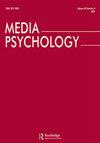具象与抽象性:媒介特征认同的因果关系
IF 2.6
2区 心理学
Q1 COMMUNICATION
引用次数: 0
摘要
我们探索了与表征的具体性或抽象性相关的媒体特征认同的新前因和后果。首先,我们考察了主人公的行为是如何影响读者对她的认同的。参与者阅读了四种叙述中的一种,在这四种叙述中,我们操纵了角色的日常行为(抽象特征)和她在特定糟糕日子的行为(具体状态)。正如预期的那样,当角色具有积极特质但在消极情境下表现得不友善时,与其他情境相比,读者(N = 206)通过更高情境归因的中介更强烈地认同她,即将主角的行为更多地归因于情境而不是她的特质。然后,我们考察了认同对读者具体思维和抽象思维的影响。我们假设并发现,与对主人公的具体计划和对情境的反应的越来越具体的思考有关,而不是对主人公生活的抽象思考,这与对角色的更强的认同有关。此外,通过对人物的具体想法的部分中介,更强的认同与读者对自己的更具体的想法相关联。这些发现可以调和先前关于认同的不一致结果,并对叙事说服具有启示意义。本文章由计算机程序翻译,如有差异,请以英文原文为准。
Concreteness and Abstractness as Causes and Effects of Identification with Media Characters
We explored new antecedents and consequences of identification with media characters that are related to concreteness or abstractness of representations. First, we examined how the portrayal of the protagonist’s behavior affects the reader’s identification with her. Participants read one of four narratives in which we manipulated the character’s usual behavior (abstract traits) and her behavior on a specific bad day (concrete states). As expected, when the character had positive traits but behaved unkindly in the negative situation, compared to the other conditions, the readers (N = 206) identified more strongly with her through the mediation of higher situational attributions, i.e. attributing the protagonist’s behavior more to the situation than to her traits. Then we examined the effect of identification on the readers’ concrete and abstract thoughts. We hypothesized and found that stronger identification with the character was related to increasingly more concrete thinking about the protagonist’s specific plans and reactions regarding the situation than abstract thinking about the protagonist’s life in general. Additionally, stronger identification was associated with more concrete thoughts about the readers themselves through the partial mediation of concrete thoughts about the character. These findings may reconcile previous inconsistent results about identification and have implications for narrative persuasion.
求助全文
通过发布文献求助,成功后即可免费获取论文全文。
去求助
来源期刊

Media Psychology
Multiple-
CiteScore
8.60
自引率
7.10%
发文量
30
期刊介绍:
Media Psychology is an interdisciplinary journal devoted to publishing theoretically-oriented empirical research that is at the intersection of psychology and media communication. These topics include media uses, processes, and effects. Such research is already well represented in mainstream journals in psychology and communication, but its publication is dispersed across many sources. Therefore, scholars working on common issues and problems in various disciplines often cannot fully utilize the contributions of kindred spirits in cognate disciplines.
 求助内容:
求助内容: 应助结果提醒方式:
应助结果提醒方式:


